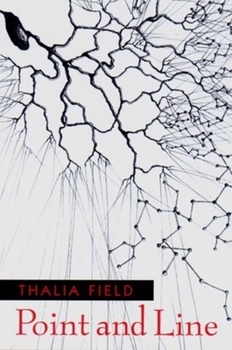Point and Line
The new book spanning the genres of poetry, fiction, and theater, by the highly-acclaimed Thalia Field. The wonderful writings in Thalia Field's long-awaited new book Point and Line deny categorization, they are "nicheless." Perhaps describable as "epic poetries," these riveting pieces represent a confluence of genres in which Thalia Field has been involved over the course of her career: fiction, theater, and poetry. Written from a constructivist, post-genre sensibility, they elude classification, and present the author's concern with clarity in a world that resists it. For instance, in "Hours" and "Setting, the Table," Field uses indeterminate performance techniques to emphasize the categorical/conceptual nature of thought. Other pieces use generative schemes, portraits of mental shapes, which create meaning out of noise. Visually, each chapter is captivating, showing the author's need for shapes and colors in her work, her fascination with the contours of speech.
Format:Paperback
Language:English
ISBN:0811214427
ISBN13:9780811214421
Release Date:April 2000
Publisher:New Directions Publishing Corporation
Length:148 Pages
Weight:0.60 lbs.
Dimensions:0.5" x 6.1" x 9.0"
Customer Reviews
5 ratings
Beautiful to see
Published by Thriftbooks.com User , 18 years ago
I was assigned this book for a writing class, and I confess that I have very little idea of what is going on in it. I kept asking classmates if they could explain a section to me, only to be disappointed when they weren't sure, either! It is an extremely difficult book to grasp as a whole. However, it is absolutely beautiful. I might not know what Field is trying to say, but I can look at the pages for hours and enjoy how she says it. The layouts of the various pieces mimic the standard styles for other types of writing, while twisting them to suit Field's purpose. Within these pieces, the words themselves seem to be placed to mimic the traditional while saying something completely new, much like the layouts. Examples: the "content" section at the beginning, the "first lines" at the end - both fairly standard for a book of poetry, but with text that does not play the standard role. Instead, these are whole pieces to themselves. Point and Line requires several reads to fully appreciate it, and I look forward to doing so.
WOW!
Published by Thriftbooks.com User , 24 years ago
As a homemaker in Pennsylvania, I rarely cross paths with such refreshing and challenging work as Thalia Field's. The chapters "Setting, The Table" and "Walking" opened me up to a whole range of stories buried in the everyday details of the home: "the debris leaves/the deafness of the/elderly or/the watermark of drinking glasses/put down so long/even the stain has aged..." I don't know what to call this book--a poem, a novel, a play? All I know is that it's pretty darn amazing.
I feel appreciated for being a good customer
Published by Thriftbooks.com User , 24 years ago
The book is amazing. People who think the book is post-modern, experimental hype are people who, I imagine, still read Tennyson aloud to their parakeets and, to boot, can hold converstions about Tennyson with humans at parties. Field's book, on the other hand, is something to take with you, as a map, when you are alone in New York City or Alaska, and your mind and body feel a bit numb. Wake up! This is a book to make your spine go white. Check out Kim Fortier's review in Rain City. Let's not be boring.
Sparkling, fresh and brilliant debut
Published by Thriftbooks.com User , 24 years ago
The critical acclaim that has accompanied this book of poetry into the world was if anything too understated. The writing sparkles like a cut diamond and the sensibility of the poet is unflaggingly curious and observant. Well worth the effort --
Look in Publishers Weekly
Published by Thriftbooks.com User , 24 years ago
The March 6, 2000 edition of Publishers Weekly at p 107 calls this book a "remarkable debut". The reviewer describes the book as a "set of nine discrete poetic essays, post-modern myths, apparently unactable theatre-pieces, versified diaries, extended jokes and fictional experiments (along the tonal lines of Gillian McCain and others)" which "add up to, as the Kandinsky epigraph describes it, 'a new, independent life in accordance with its own laws.'" "'Seven Veils', from which the opening quote is taken, uses long lines to tell the semi- or pseudo-story of a teenager who happens to be a comet as she careens brilliantly through 'dummies,' 'governments,' 'households,' animals and rites of passage. Heavily indebted to Wittgenstein, 'A:.1' interweaves the thoughts of an analysand with ideas about other situations, among them that of a cat in a famous philosophical quandary. 'The Compass Room' experiments with perspectivism, multiple narrators and vague settings, in a way readers of John Barth will recognize: 'Each book has a title and all chapters have numbers,' it opens. 'Walking' tries to recreate the moment-by-moment perceptual experience of a walker in a city, scattering phrases, lists, associations and sentences all over its 23 pages, in an ambitious update of late-model New York School verse. 'Hours' is a postmodern parody of a play-script, with impossible stage directions for 'Microbes' and 'Whales.'" The reviewer concludes: "While the methods of proceeding are familiar, the characters and results are not, making this wonderfully varied first book a real pleasure."





